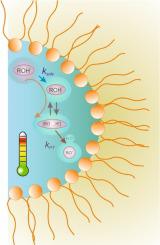Journal of Photochemistry and Photobiology A: Chemistry ( IF 4.1 ) Pub Date : 2020-09-24 , DOI: 10.1016/j.jphotochem.2020.112928 Sk Imadul Islam , Arindam Das , Rajib Kumar Mitra

|
Excited state proton transfer (ESPT) is a fundamental process of immense biophysical interest and considering the heterogeneity existing in real biological environments we investigate the process in a bio-mimicking reverse micellar (RM) systems. We herein report a detailed study on the ESPT process of a photo-acid d-luciferin at different temperatures in RMs composed of: anionic AOT, cationic DDAB, and neutral Igepal-520 using steady state and time resolved fluorescence measurements. We found that with increasing temperature both solvation as well as the ESPT rate accelerate, however, the extent of the increase is RM specific, and they even not complement each other. Our study clearly identifies the pivotal role of solvation, specially in micro-heterogeneous environments, to guide the ESPT process.
中文翻译:

反向胶束中的兴奋态质子转移:温度的影响以及与溶剂化的可能相互作用
兴奋态质子转移(ESPT)是引起巨大生物物理兴趣的基本过程,考虑到真实生物环境中存在的异质性,我们研究了仿生反胶束(RM)系统中的过程。我们在本文中报告了使用稳态和时间分辨荧光测量方法在由RM组成的RM中,在不同温度下光酸d-萤光素的ESPT过程的详细研究,该阴离子包括:阴离子AOT,阳离子DDAB和中性Igepal-520。我们发现随着温度的升高,溶剂化和ESPT速率均加快,但是,升高的程度是RM特有的,它们甚至不能互补。我们的研究清楚地确定了溶剂化的关键作用,特别是在微非均质环境中,可以指导ESPT过程。











































 京公网安备 11010802027423号
京公网安备 11010802027423号